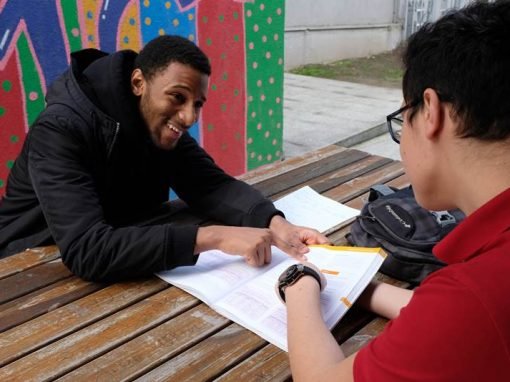Sociology (9699)
In a rapidly changing world, Cambridge International AS and A Level Sociology offers learners the opportunity not only to explore the processes that are shaping current trends, but also to develop an understanding of the complexity and diversity of human societies and their continuities with the past.
The study of sociology stimulates awareness of contemporary social, cultural and political issues, and focuses on the importance of examining these issues in a rigorous, reasoned and analytical way.
We recommend students that register to this course, have an IGCSE certificate in First Language English with a minimum mark of C or an IGCSE certificate in English as a Second Language with a minimum mark of A. If registering students have completed a curriculum that is not Cambridge International in grades 9 and 10, they will be required to sit an entrance examination at our High School Campus.
Link to full Syllabus: https://www.cambridgeinternational.org/Images/502972-2021-2023-syllabus.pdf
Key Benefits
Cambridge International AS & A Level Sociology encourages learners to think sociologically about contemporary social, cultural and political issues. The syllabus provides opportunities to explore key concepts and debates that underpin the discipline of sociology and to develop the skills of interpretation, application, analysis and evaluation while studying a range of stimulating topics and real-world issues.
Our approach in Cambridge International AS & A Level Sociology encourages learners to be:
- confident, communicating sociological ideas and arguments to others, and exploring contemporary social issues with maturity and insight
- responsible, recognizing the importance of culture and community and able to appreciate cultural differences and alternative perspectives on social issues
- reflective, reviewing and refining their skills of analysis and evaluation and drawing connections between specific examples and wider issues
- innovative, developing informed views about real-world issues, and an ability to think sociologically to understand problems and respond to questions
- engaged, learning through independent study and collaboration; debating issues and using research findings to tackle sociological questions.
Key Concepts
Key concepts are essential ideas that help students develop a deep understanding of their subject and make links between different aspects. Key concepts may open up new ways of thinking about, understanding or interpreting the important things to be learned.
The key concepts for Cambridge International AS & A Level Sociology are:
- Inequality and opportunity
Inequality has a major influence on people’s opportunities and life choices. Sociologists study the different forms of inequality (age, ethnicity, gender, class), seeking to understand why inequality exists and how it affects different sections of society.
- Power, control and resistance
Power is important in understanding how order and control are achieved in society. There are many different theories about who holds power and how power is used to shape human behaviour. Sociologists are also interested in the ways people oppose and resist the exercise of power.
- Social change and development
Understanding how societies have changed and developed helps sociologists to make sense of the way people live today. The change from traditional society to modern industrial society is particularly important. The terms ‘modernity’ and ‘post-modernity’ are used to reflect on this transition and on contemporary issues, such as how societies are affected by globalisation and the digital revolution in technology.
- Socialisation, culture and identity
Sociologists believe that people learn how they are expected to behave through socialisation. The norms and values learned through socialisation may vary between cultures, impacting on social identity. The study of different social identities is central to contemporary sociology.
- Structure and human agency
A central debate in sociology concerns the relationship between the individual and society: is behaviour shaped by wider social forces or is the social world shaped by the actions of individuals? Structural theories focus on how people’s behaviour is constrained by social systems and institutions. Action theories emphasise how individuals establish meaning through social interaction and how this impacts on the behaviour of social groups and institutions.
Recognition and progression
Cambridge Internationals expertise in curriculum, teaching and learning, and assessment is the basis for the recognition of Cambridge International programmes and qualifications around the world. Every year thousands of students with Cambridge International AS & A Levels gain places at leading universities worldwide. They are valued by top universities around the world including those in the UK, US (including Ivy League universities), Europe, Australia, Canada and New Zealand.
UK NARIC, the national agency in the UK for the recognition and comparison of international qualifications and skills, has carried out an independent benchmarking study of Cambridge International AS & A Level and found it to be comparable to the standard of AS & A Level in the UK. This means students can be confident that their Cambridge International AS & A Level qualifications are accepted as equivalent, grade for grade, to UK AS & A Levels by leading universities worldwide.
Cambridge International AS Level Sociology makes up the first half of the Cambridge International A Level course in sociology and provides a foundation for the study of sociology at Cambridge International A Level. Depending on local university entrance requirements, students may be able to use it to progress directly to university courses in sociology or some other subjects. It is also suitable as part of a course of general education.
Cambridge International A Level Sociology provides a foundation for the study of sociology or related courses in higher education. Equally it is suitable as part of a course of general education.
Resources
The following are the preferred resources at Istanbul International School:
- Cambridge AS/A Level Sociology 9699 Coursebook
- Variety of resources determined by teacher
Cambridge International Examinations
AS Level candidates take:
Paper 1
Socialisation, identity and methods of research – 50% (1 hour 30 minutes)
Candidates answer four questions.
Section A: three compulsory questions Section B: one essay from a choice of two
Externally assessed
Paper 2
The Family – 50% (1 hour 30 minutes)
Candidates answer four questions.
Section B: one essay from a choice of two
Externally assessed
A Level candidates take:
Paper 1
Socialisation, identity and methods of research – 25% (1 hour 30 minutes)
Candidates answer four questions.
Section A: three compulsory questions Section B: one essay from a choice of two
Externally assessed
Paper 2
The Family – 25% (1 hour 30 minutes)
Candidates answer four questions.
Section B: one essay from a choice of two
Externally assessed
Paper 3
Education – 20% (1 hour 15 minutes)
Candidates answer four compulsory questions.
Question 4 is an essay
Externally assessed
Paper 4
Globalisation, Media and Religion – 30% (1 hour 45 minutes)
Candidates answer two essay questions
Section A: Globalisation
Section B: Media
Section C: Religion
Each section has two essay questions. Candidates select one question from two different sections.
Externally assessed
SUBJECTS














